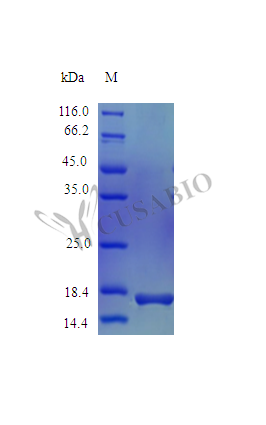Recombinant Mouse Interleukin-1 beta protein (Il1b) is produced in E. coli and covers the complete mature protein sequence from amino acids 118-269. This tag-free product achieves purity levels above 96% when analyzed by SDS-PAGE. Endotoxin levels remain below 1.0 EU/µg, as measured by the LAL method. The protein shows full biological activity with an ED50 under 2 pg/ml in cell proliferation assays using murine D10S cells, which translates to a specific activity exceeding 5.0 × 10^8 IU/mg.
Interleukin-1 beta (Il1b) functions as a pro-inflammatory cytokine and appears to be central in coordinating immune and inflammatory responses. The protein participates in multiple cellular processes - cell proliferation, differentiation, and apoptosis among them. Given its important position in immune system function, Il1b has become a major focus in inflammation and immune regulation research. Understanding its activity may be crucial for unraveling disease mechanisms and creating new therapeutic approaches.
Potential Applications
Note: The applications listed below are based on what we know about this protein's biological functions, published research, and experience from experts in the field. However, we haven't fully tested all of these applications ourselves yet. We'd recommend running some preliminary tests first to make sure they work for your specific research goals.
1. Cell Proliferation and Activation Assays
This recombinant mouse IL-1β protein is highly biologically active (ED₅₀ < 2 pg/ml) and suitable for stimulating various immune cell types. The exceptional specific activity (>5.0×10⁸ IU/mg) and minimal endotoxin content ensure reliable dose-response experiments in primary mouse immune cells or established lines. Researchers can confidently use it to study IL-1β signaling pathways, cytokine production, and inflammatory responses with minimal risk of contamination-related artifacts.
2. Cytokine Network and Inflammatory Response Studies
The protein is ideal for examining IL-1β's role in complex cytokine networks and inflammatory cascades. The high purity (>96%) and potent biological activity make it well-suited for studying downstream production of IL-6, TNF-α, and other mediators in mouse cell cultures. The extremely low ED₅₀ ensures that even minimal concentrations will elicit measurable responses, enabling precise studies of cytokine kinetics and synergistic effects with other inflammatory triggers.
3. Antibody Development and Validation
This biologically active IL-1β serves as an excellent antigen for antibody development. The mature protein sequence (118-269aa) matches the natural form, facilitating production of antibodies that recognize native IL-1β. The tag-free design and high purity minimize non-specific reactivity. The confirmed bioactivity indicates proper folding, ensuring antibodies will recognize functional epitopes relevant for neutralization assays and immunological applications.
4. Receptor Binding and Signaling Studies
The proven biological activity confirms proper folding for receptor engagement, making this protein suitable for studying interactions with IL-1R1 and accessory proteins. It can be used in competitive binding assays, affinity measurements, and signal transduction studies. The high potency ensures reliable activation of downstream pathways, including NF-κB and MAPK signaling in mouse experimental models.
5. Preclinical Inflammation Model Development
This IL-1β is excellent for establishing standardized laboratory inflammation models. The reliable activity and minimal endotoxin content enable the creation of reproducible inflammatory conditions for testing anti-inflammatory compounds or studying disease mechanisms. Researchers can use precise concentrations to trigger controlled inflammatory responses in cell culture systems, providing a robust platform for preclinical research.
Final Recommendation & Action Plan
This E. coli-expressed mouse IL-1β is an exceptional research reagent with outstanding biological activity and purity, making it suitable for all proposed applications. For immediate use, employ it at low concentrations (starting from picogram range) in proliferation, activation, and signaling studies, leveraging its high specific activity for precise dose-response experiments. For antibody development, this protein is ideal for immunization and assay validation. When establishing inflammation models, use the documented ED₅₀ as a starting point for optimization. While the E. coli expression system produces a non-glycosylated protein, the demonstrated exceptional bioactivity confirms proper folding and functionality. For all applications, include proper controls and consider that the extreme potency may require careful dilution schemes to avoid over-stimulation in sensitive assays.






